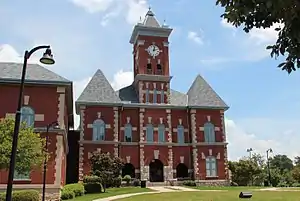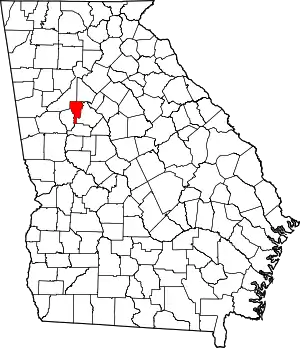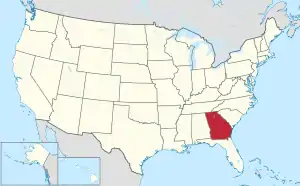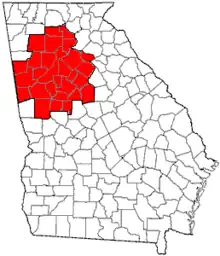Clayton County, Georgia
Clayton County is located in the north central portion of the U.S. state of Georgia. As of 2021, the population was estimated to be 297,100 by the Census Bureau.[1] The county seat is Jonesboro.[2]
Clayton County | |
|---|---|
 | |
 Location within the U.S. state of Georgia | |
 Georgia's location within the U.S. | |
| Coordinates: 33°32′N 84°22′W | |
| Country | |
| State | |
| Founded | November 30, 1858 |
| Named for | Augustin Smith Clayton |
| Seat | Jonesboro |
| Largest city | Forest Park |
| Area | |
| • Total | 144 sq mi (370 km2) |
| • Land | 142 sq mi (370 km2) |
| • Water | 2.8 sq mi (7 km2) 1.9% |
| Population | |
| • Estimate (2021) | 297,100 |
| • Density | 2,101/sq mi (811/km2) |
| Time zone | UTC−5 (Eastern) |
| • Summer (DST) | UTC−4 (EDT) |
| Congressional districts | 5th, 13th |
| Website | www |
Clayton County is included in the Atlanta metropolitan area, and is the fifth most-populous county in the state. It is the home of most of Hartsfield–Jackson Atlanta International Airport,[3] the busiest airport in the world by total passengers.[4]
History
The county was established in 1858 and named in honor of Augustin Smith Clayton (1783–1839), who served in the United States House of Representatives from 1832 until 1835.[5]
Clayton County was a battle site during the American Civil War, with the Battle of Jonesborough and the Battle of Lovejoy's Station taking place in the area.
Geography
According to the U.S. Census Bureau, the county has a total area of 144 square miles (370 km2), of which 142 square miles (370 km2) is land and 2.8 square miles (7.3 km2) (1.9%) is water.[6] It is the third-smallest county by area in Georgia.
The eastern portion of Clayton County, between Forest Park and Lovejoy, is located in the Upper Ocmulgee River sub-basin of the Altamaha River basin. The western portion of the county is located in the Upper Flint River sub-basin of the ACF River Basin (Apalachicola-Chattahoochee-Flint River Basin).[7]
Adjacent counties
- DeKalb County (northeast)
- Henry County (east)
- Spalding County (south)
- Fayette County (southwest)
- Fulton County (northwest)
Demographics
| Census | Pop. | Note | %± |
|---|---|---|---|
| 1860 | 4,466 | — | |
| 1870 | 5,477 | 22.6% | |
| 1880 | 8,027 | 46.6% | |
| 1890 | 8,295 | 3.3% | |
| 1900 | 9,598 | 15.7% | |
| 1910 | 10,453 | 8.9% | |
| 1920 | 11,159 | 6.8% | |
| 1930 | 10,260 | −8.1% | |
| 1940 | 11,655 | 13.6% | |
| 1950 | 22,872 | 96.2% | |
| 1960 | 46,365 | 102.7% | |
| 1970 | 98,043 | 111.5% | |
| 1980 | 150,357 | 53.4% | |
| 1990 | 182,052 | 21.1% | |
| 2000 | 236,517 | 29.9% | |
| 2010 | 259,424 | 9.7% | |
| 2020 | 297,595 | 14.7% | |
| U.S. Decennial Census[8] 1790-1960[9] 1900-1990[10] 1990-2000[11] 2010-2019[12] | |||
2020 Census
| Race | Num. | Perc. |
|---|---|---|
| White (non-Hispanic) | 25,902 | 8.7% |
| Black or African American (non-Hispanic) | 205,301 | 68.99% |
| Native American | 601 | 0.2% |
| Asian | 13,491 | 4.53% |
| Pacific Islander | 119 | 0.04% |
| Other/mixed | 9,635 | 3.24% |
| Hispanic or Latino | 42,546 | 14.3% |
As of the 2020 United States census, there were 297,595 people, 97,030 households, and 62,746 families residing in the county.
2010 Census
As of the 2010 United States Census, there were 259,424 people, 90,633 households, and 62,389 families residing in the county.[14] The population density was 1,832.5 inhabitants per square mile (707.5/km2). There were 104,705 housing units at an average density of 739.6 per square mile (285.6/km2).[15] The racial makeup of the county was 66.1% black or African American, 18.87% white, 5.0% Asian, 0.4% American Indian, 0.1% Pacific islander, 7.1% from other races, and 2.5% from two or more races. Those of Hispanic or Latino origin made up 13.66% of the population.[14] In terms of ancestry, 4.9% were "American".[16]
Of the 90,633 households, 42.1% had children under the age of 18 living with them, 36.4% were married couples living together, 25.3% had a female householder with no husband present, 31.2% were non-families, and 25.4% of all households were made up of individuals. The average household size was 2.82 and the average family size was 3.37. The median age was 31.6 years.[14]
The median income for a household in the county was $43,311 and the median income for a family was $48,064. Males had a median income of $36,177 versus $32,460 for females. The per capita income for the county was $18,958. About 13.6% of families and 16.7% of the population were below the poverty line, including 24.5% of those under age 18 and 8.8% of those age 65 or over.[17]
2000 Census
As of the 2000 census,[18] there were 236,517 people, 82,243 households, and 59,214 families residing in the county. The population density was 1,658 inhabitants per square mile (640/km2). There were 86,461 housing units at an average density of 606 per square mile (234/km2). The racial makeup of the county was 37.94% White, 51.55% Black or African American, 0.32% Native American, 4.49% Asian, 0.07% Pacific Islander, 3.55% from other races, and 2.08% from two or more races. 7.50% of the population were Hispanic or Latino of any race.
Estimated 2006 population is 271,240, with a racial make-up of 20.4% white non-Hispanic, 62.9% African American, 5% Asian, 11.3% Hispanic or Latino, 0.4% American Indian or Alaska Native, and 0.1% Pacific Islander. 1.5% were reported as multi-racial.
There were 82,243 households, out of which 40.70% had children under the age of 18 living with them, 45.70% were married couples living together, 20.30% had a female householder with no husband present, and 28.00% were non-families. 21.80% of all households were made up of individuals, and 3.60% had someone living alone who was 65 years of age or older. The average household size was 2.84 and the average family size was 3.30.
In the county, the population was spread out, with 30.00% under the age of 18, 10.40% from 18 to 24, 35.40% from 25 to 44, 18.40% from 45 to 64, and 5.90% who were 65 years of age or older. The median age was 30 years. For every 100 females, there were 94.50 males. For every 100 females age 18 and over, there were 90.90 males.
The median income for a household in the county was $42,697, and the median income for a family was $46,782. Males had a median income of $32,118 versus $26,926 for females. The per capita income for the county was $18,079. About 8.20% of families and 10.10% of the population were below the poverty line, including 13.20% of those under age 18 and 8.90% of those age 65 or over.
The last quarter-century has seen significant change in the racial composition of the county's population. In 1980, Clayton county's population was 150,357 — 91% white and 9% minority,[19] while in 2006 the population was approximately 271,240 — 20% white and 80% minority.[20]
Crime and policing
The Clayton County Police Department has an authorized strength of 525 personnel headed by Chief Kevin Roberts.[21] Other law enforcement services (courts, jail, warrants) are provided by the Clayton County Sheriff's Office.[22]
On April 26, 2021, Sheriff Victor Hill was indicted on charges of federal civil rights violations.[23] On June 2, 2021, he was suspended by Governor Brian Kemp following a review of the indictment.[24] On October 26, 2022, Sheriff Victor Hill was found guilty of violating civil rights of jail detainees. [25]
Economy
The unemployment rate in Clayton County was 3.4% as of November 2019. Future job growth over the next ten years was predicted to be at 29.90%. Clayton County's sales tax rate is 8.00%. The income tax is 6.00%. Clayton County's income and salaries per capita is $18,735, which includes all adults and children. The median household income is $39,699.
ValuJet Airlines was headquartered in northern, unincorporated Clayton County, near Hartsfield Jackson Atlanta International Airport, in the 1990s.[26]
Transportation
Major highways
 Interstate 75
Interstate 75 Interstate 85
Interstate 85 Interstate 285
Interstate 285 Interstate 675
Interstate 675 U.S. Route 19
U.S. Route 19 U.S. Route 23
U.S. Route 23 U.S. Route 29
U.S. Route 29 U.S. Route 41
U.S. Route 41 State Route 3
State Route 3 State Route 3 Connector
State Route 3 Connector State Route 42
State Route 42 State Route 54
State Route 54 State Route 85
State Route 85 State Route 138
State Route 138 State Route 138 Spur
State Route 138 Spur State Route 139
State Route 139 State Route 314
State Route 314 State Route 331
State Route 331 State Route 401 (unsigned designation for I-75)
State Route 401 (unsigned designation for I-75) State Route 403 (unsigned designation for I-85)
State Route 403 (unsigned designation for I-85) State Route 407 (unsigned designation for I-285)
State Route 407 (unsigned designation for I-285) State Route 413 (unsigned designation for I-675)
State Route 413 (unsigned designation for I-675)
Rail
Commuter rail service is proposed to serve Clayton County along the Norfolk Southern line,[27] with proposed stations in Forest Park, Morrow, Jonesboro, and initially ending at Lovejoy.
The Metropolitan Atlanta Rapid Transit Authority's Airport station is located in Clayton.
Pedestrians and cycling
- Jesters Creek Trail
- Morrow Trail
- Clayton Connects
Education
Clayton County Public Schools is the fifth largest school system in Georgia. The district currently has 52,000 students enrolled in its 63 schools. Under the current Superintendent Dr. Anthony W. Smith, the district has a strategic plan that includes the vision and mission statements and its motto “Building a Better Tomorrow, Today!” Clayton County has 22 elementary and five middle schools that have been deemed by the Georgia Department of Education as Distinguished Schools. This is based on the number of consecutive years of making AYP.
Special schools and programs
Lovejoy High School hosts the district International Baccalaureate Program (IB). The IB Diploma Program is designed as an academically challenging and balanced program of education with final exams that prepare students for success at the university level and life beyond.
CCPS has two charter schools. Unidos Dual Language, Georgia's first public dual language school is a model of excellence in language education. Unidos serves students in pre-kindergarten through sixth grades. The second charter school is the Elite Scholars Academy; the school serves grades 6-10 and planned to expand to the twelfth grade by 2014. The school operates on a year-round calendar. Any student in the district may apply to enroll. Selection is based on a random lottery.
Clayton County also has a Math and Science Magnet and three fine arts magnet programs at Jackson Elementary, MD Robert's Middle, and Martha Ellen Stilwell. Enrollment is based on application and/or audition.
2008 de-accreditation
The 50,000-student school system was the first in the nation to lose accreditation since 1969. The Southern Association of Colleges and Schools (SACS) revoked the school district's accreditation on August 28, 2008.[28] It was only the second system in the nation to do so since 1960. A grand jury investigated and considered possible criminal indictments against the Clayton County School Board. At issue was whether the school board committed malfeasance in ignoring the shortcomings of the school system and violating its own rules concerning the awarding of bids of contracts.
School Board Chairwoman Ericka Davis announced her resignation on April 2, 2008, amidst the allegations. Clayton County Commission Chairman Eldrin Bell called for the resignations of all Clayton County School Board members.[29] Amid controversy and orders for the police to quiet citizens, the Clayton County School Board hired a new temporary superintendent on April 26, 2008. This was despite the fact that the new superintendent did not meet the qualifications set forth by SACS.[30]
The Clayton County Public School System was re-accredited by SACS on May 1, 2009.[31]
Higher education
Clayton State University is located in Morrow.
Media
- Clayton Crescent:[32] news about Clayton County and adjoining areas, part of the Institute for Nonprofit News
- Clayton News[33] (formerly Clayton News-Daily): county legal organ, part of the Southern Community Newspapers, Inc. chain
- South Atlanta Magazine:[34] lifestyle and profiles magazine focusing on Clayton County
- CCTV23:[35] Clayton County government access television (Ch. 23 on Xfinity, Ch. 99 on AT&T UVerse)
Communities
Cities
Unincorporated communities
Politics
For most of the 1960s to the 1980s, Clayton County was a swing county. It voted for Governor Jimmy Carter in 1976 with around 65 percent of the vote, but then voted for Ronald Reagan with over 70 percent of the vote in 1984. However, due to extensive black in-migration, starting in 1992 Clayton County has swung heavily Democratic and is now one of the most Democratic counties in the country. It has given the Democratic presidential candidate over eighty percent of the vote in every election since 2008. In 2020, for instance, it gave Joe Biden 85 percent of the vote, his strongest showing in the state.
| Year | Republican | Democratic | Third party | |||
|---|---|---|---|---|---|---|
| No. | % | No. | % | No. | % | |
| 2020 | 15,811 | 14.07% | 95,466 | 84.94% | 1,114 | 0.99% |
| 2016 | 12,645 | 13.51% | 78,220 | 83.59% | 2,715 | 2.90% |
| 2012 | 14,164 | 14.72% | 81,479 | 84.67% | 587 | 0.61% |
| 2008 | 16,506 | 16.59% | 82,527 | 82.93% | 481 | 0.48% |
| 2004 | 23,106 | 29.01% | 56,113 | 70.46% | 424 | 0.53% |
| 2000 | 19,966 | 32.52% | 40,042 | 65.21% | 1,394 | 2.27% |
| 1996 | 20,625 | 37.34% | 30,687 | 55.55% | 3,930 | 7.11% |
| 1992 | 23,965 | 41.33% | 25,890 | 44.65% | 8,134 | 14.03% |
| 1988 | 28,225 | 65.43% | 14,689 | 34.05% | 223 | 0.52% |
| 1984 | 31,553 | 72.84% | 11,763 | 27.16% | 0 | 0.00% |
| 1980 | 19,160 | 50.35% | 17,540 | 46.10% | 1,351 | 3.55% |
| 1976 | 12,905 | 37.58% | 21,432 | 62.42% | 0 | 0.00% |
| 1972 | 23,681 | 86.36% | 3,740 | 13.64% | 0 | 0.00% |
| 1968 | 8,256 | 35.22% | 3,517 | 15.01% | 11,665 | 49.77% |
| 1964 | 10,488 | 64.08% | 5,869 | 35.86% | 10 | 0.06% |
| 1960 | 2,953 | 33.39% | 5,892 | 66.61% | 0 | 0.00% |
| 1956 | 1,593 | 22.39% | 5,522 | 77.61% | 0 | 0.00% |
| 1952 | 1,230 | 23.26% | 4,058 | 76.74% | 0 | 0.00% |
| 1948 | 339 | 10.29% | 2,192 | 66.50% | 765 | 23.21% |
| 1944 | 245 | 11.81% | 1,828 | 88.14% | 1 | 0.05% |
| 1940 | 161 | 10.42% | 1,382 | 89.45% | 2 | 0.13% |
| 1936 | 175 | 11.44% | 1,352 | 88.37% | 3 | 0.20% |
| 1932 | 35 | 2.49% | 1,361 | 97.01% | 7 | 0.50% |
| 1928 | 619 | 50.28% | 612 | 49.72% | 0 | 0.00% |
| 1924 | 46 | 11.68% | 273 | 69.29% | 75 | 19.04% |
| 1920 | 34 | 6.68% | 475 | 93.32% | 0 | 0.00% |
| 1916 | 3 | 0.50% | 517 | 86.89% | 75 | 12.61% |
| 1912 | 3 | 0.54% | 443 | 79.25% | 113 | 20.21% |
| 1908 | 223 | 38.32% | 248 | 42.61% | 111 | 19.07% |
| 1904 | 59 | 10.50% | 333 | 59.25% | 170 | 30.25% |
| 1900 | 179 | 32.02% | 346 | 61.90% | 34 | 6.08% |
| 1896 | 472 | 46.41% | 516 | 50.74% | 29 | 2.85% |
| 1892 | 335 | 27.59% | 518 | 42.67% | 361 | 29.74% |
| 1888 | 224 | 27.05% | 604 | 72.95% | 0 | 0.00% |
| 1884 | 279 | 35.59% | 505 | 64.41% | 0 | 0.00% |
| 1880 | 148 | 27.92% | 382 | 72.08% | 0 | 0.00% |
In popular culture
Parts of Margaret Mitchell's epic 1936 novel Gone with the Wind and the famous 1939 motion picture Gone with the Wind were set in Clayton County, including the location of the fictional plantation, Tara. Tara Boulevard was named for the plantation; it is the main north–south road through the county, carrying U.S. 41 and lesser-known State Route 3. Parts of the novels Rhett Butler's People and Scarlett and the Scarlett television miniseries also took place in Clayton County. Rhett Butler's People is a prequel, sequel, and companion to Gone with the Wind. Scarlett is a sequel to Gone with the Wind, and also takes place briefly in Clayton County. The fictional Twelve Oaks Plantation and others mentioned in these novels are located in and around Clayton County. Mitchell's family's plantation, Rural Home, was located in Clayton County.
The 2012 film Flight features Clayton County throughout the film.
Parts of the film Smokey and the Bandit were shot in and around Clayton County, namely in Jonesboro, as evidenced by a sign in the background of one of the scenes. Even though this particular scene was supposed to be set in Arkansas, a "Willow Bend" sign advertising brick homes in Clayton County can be spotted behind Sheriff George Branford. Many back roads and the movie town of Texarkana are actually the roads and the town of Jonesboro.
See also
References
- "U.S. Census Bureau QuickFacts: Georgia". U.S. Census Bureau, Population Division. Retrieved July 31, 2022.
- "Find a County". National Association of Counties. Archived from the original on May 31, 2011. Retrieved June 7, 2011.
- "Hartsfield-Jackson Intl Airport Overview and FBOs (Atlanta, GA) [KATL/ATL]". FlightAware. Retrieved January 27, 2019.
- Hunter, Marnie (April 11, 2022). "This US airport has reclaimed its title as the world's busiest". CNN.com.
- Krakow, Kenneth K. (1975). Georgia Place-Names: Their History and Origins (PDF). Macon, GA: Winship Press. p. 45. ISBN 978-0-9154-3000-0. Archived (PDF) from the original on July 10, 2003.
- "US Gazetteer files: 2010, 2000, and 1990". United States Census Bureau. February 12, 2011. Retrieved April 23, 2011.
- "Georgia Soil and Water Conservation Commission Interactive Mapping Experience". Georgia Soil and Water Conservation Commission. Retrieved November 19, 2015.
- "U.S. Decennial Census". United States Census Bureau. Retrieved June 20, 2014.
- "Historical Census Browser". University of Virginia Library. Retrieved June 20, 2014.
- "Population of Counties by Decennial Census: 1900 to 1990". United States Census Bureau. Retrieved June 20, 2014.
- "Census 2000 PHC-T-4. Ranking Tables for Counties: 1990 and 2000" (PDF). United States Census Bureau. Archived (PDF) from the original on March 27, 2010. Retrieved June 20, 2014.
- "State & County QuickFacts". United States Census Bureau. Archived from the original on June 30, 2011. Retrieved June 20, 2014.
- "Explore Census Data". data.census.gov. Retrieved December 13, 2021.
- "DP-1 Profile of General Population and Housing characteristics: 2010 Demographic Profile Data". United States Census Bureau. Archived from the original on February 13, 2020. Retrieved December 27, 2015.
- "Population, Housing Units, Area, and Density: 2010 - County". United States Census Bureau. Archived from the original on February 13, 2020. Retrieved December 27, 2015.
- "DP02 Selected Social Characteristics in the United States – 2006-2010 American Community Survey 5-Year Estimates". United States Census Bureau. Archived from the original on February 13, 2020. Retrieved December 27, 2015.
- "DP03 Selected Economic Characteristics – 2006-2010 American Community Survey 5-Year Estimates". United States Census Bureau. Archived from the original on February 13, 2020. Retrieved December 27, 2015.
- "U.S. Census website". United States Census Bureau. Retrieved May 14, 2011.
- "Index of /Census_1980/D1". Archived from the original on November 26, 2001. Retrieved March 27, 2008. at the Library of Congress (November 26, 2001)
- "Clayton County, Georgia". United States Census Bureau. 2008. Retrieved March 27, 2008.
- "Home Page". Clayton County Police Department. Retrieved March 19, 2018.
- "Home Page". Clayton County Sheriff's Office. Retrieved March 19, 2018.
- "Clayton Co. Sheriff Victor Hill Indicted on Federal Civil Rights Violations". US Department Of Justice (DOJ). April 27, 2021. Archived from the original on April 27, 2021.
- Hannah Sarisohn and Travis Caldwell. "Georgia governor suspends sheriff indicted on federal civil rights charges". CNN. Retrieved July 31, 2021.
- "Sheriff Victor Hill found guilty of civil rights violations in federal trial". WSB-TV Channel 2 - Atlanta. October 26, 2022. Retrieved October 26, 2022.
- "Civil Action No. 1-96-CV-1355-JTC Archived September 7, 2007, at the Wayback Machine." Stanford Law School. Retrieved on May 19, 2009.
- Wickert, David (December 6, 2018). "MARTA approves plans for Clayton County commuter train". The Atlanta Journal-Constitution. Retrieved December 8, 2018.
- Matteucci, Megan (August 28, 2008). "Clayton schools lose accreditation; board members ousted". The Atlanta Journal-Constitution. Retrieved August 28, 2008.
- Matteucci, Megan (April 2, 2008). "Clayton school board chairwoman steps down". The Atlanta Journal-Constitution. Retrieved April 5, 2008.
- Matteucci, Megan (May 1, 2008). "Clayton signs school chief's contract amid police presence". The Atlanta Journal-Constitution.
- Clayton County Public Schools Receive Re-accreditation. Georgia Education News May 1, 2009. Retrieved on 2013-08-16.
- Clayton Crescent
- Clayton News
- South Atlanta Magazine
- CCTV23
- Leip, David. "Dave Leip's Atlas of U.S. Presidential Elections". uselectionatlas.org. Retrieved March 19, 2018.
